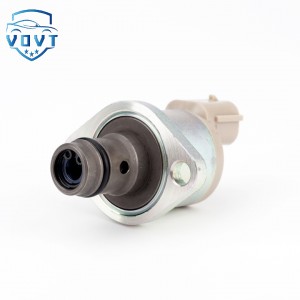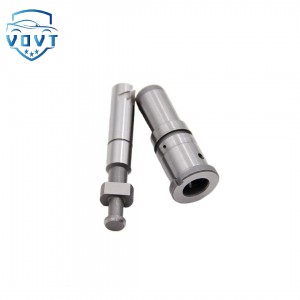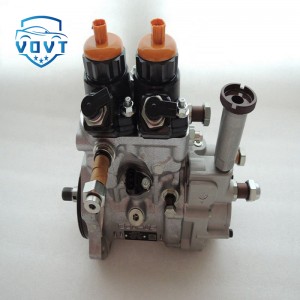Good Price Diesel Pump Head Rotor 146401-2120 Fuel Injection Pump Elements Engine Spare Parts
products description
| Reference. Codes | 146401-2120 |
| Application | / |
| MOQ | 2PCS |
| Certification | ISO9001 |
| Place of Origin | China |
| Packaging | Neutral packing |
| Quality Control | 100% tested before shipment |
| Lead time | 7~15 working days |
| Payment | T/T, L/C, Paypal, Western Union or as your requirement |
How to choose the right pump head for a specific application?
Clarify the basic requirements of the application scenario
1. Fluid medium characteristics
Medium type:
Fuel (gasoline/diesel), hydraulic oil, water, lubricating oil, corrosive liquid (such as acid/alkali solution) or particle-containing medium (such as mud).
Example: Diesel engine fuel pump head needs to be compatible with high-viscosity diesel, while hydraulic pump head needs to be compatible with anti-wear hydraulic oil.
Physical properties:
Viscosity (affects the selection of pump head type, such as low-viscosity fluid is suitable for gear pump, high viscosity is suitable for plunger pump), temperature (high temperature requires high-temperature resistant materials, such as ceramic plunger), corrosiveness (stainless steel or fluororubber seals are required).
Cleanliness:
Particle-containing media need to choose wear-resistant materials (such as tungsten carbide coating) or pump heads with filtering structures to avoid clogging or wear.
2. Working condition parameter requirements
Working pressure:
Low pressure (<10bar), medium pressure (10-100bar), high pressure (>100bar). Example: Diesel engine injection pump head requires 100-2000bar high pressure, while household water pumps are usually < 10bar.
Flow requirements:
Determine the flow rate per unit time (such as L/min, m³/h), and match the system requirements. Example: The hydraulic pump head of construction machinery needs to calculate the flow rate based on the hydraulic cylinder speed.
Working frequency:
Continuous operation or intermittent operation affects the heat dissipation design and durability selection of the pump head (such as continuous operation requires enhanced lubrication and cooling).
Select the pump head type and structure
1. Select by working principle
Pump head type Applicable scenarios Advantages Limitations
Gear pump head Lubricating oil delivery, low-pressure fuel system (such as gasoline engine fuel pump) Simple structure, low cost, good pollution resistance Pressure ≤20bar, large flow pulsation
Plunger pump head Diesel engine high-pressure fuel injection (100-2000bar), hydraulic system (high-pressure working conditions) High pressure, precise and controllable flow Complex structure, high requirements for oil cleanliness
Vane pump head Hydraulic system (medium pressure scenario, 10-200bar), machine tool lubrication system Uniform flow, low noise Poor pollution resistance, fine filtration required
Centrifugal pump head Water pump (water supply, irrigation), cooling system Large flow, simple structure Low pressure, not suitable for high-viscosity fluids
2. Match by drive mode
Mechanical drive: Directly driven by the engine crankshaft and camshaft (such as diesel engine injection pump), the speed and transmission ratio need to be matched.
Electric drive: Motor drive (such as electric fuel pump), the matching of voltage, power and pump head efficiency needs to be considered.
Matching of key performance parameters
Pressure-flow curve
The rated pressure of the pump head should be 10%-20% higher than the actual working pressure (leave a safety margin), and the flow rate should cover the maximum demand of the working condition. For example: the hydraulic system working pressure is 150bar, and a plunger pump head with a rated pressure of 180-200bar should be selected.
Efficiency and energy consumption
For high-pressure scenarios, plunger pumps (efficiency 80%-90%) are preferred, and centrifugal pumps (efficiency 60%-80%) are selected for low-pressure and high-flow, taking into account energy saving and cost.
Temperature resistance and corrosion resistance
For high-temperature environments (such as engine compartments), metal pump heads (aluminum alloy, stainless steel) should be selected, with a temperature resistance of ≥120℃; corrosive media require fluororubber seals or titanium alloy parts.
4. Installation and compatibility considerations
Interface and installation dimensions
Match the system interface type (such as threaded interface M18×1.5, flange interface) and installation space to avoid assembly failure due to size mismatch. Example: The automobile fuel pump head needs to adapt to the installation hole and pipeline interface of the fuel rail.
Lubrication and cooling requirements
The plunger pump head relies on fuel or hydraulic oil for self-lubrication, and the system oil circuit must be kept clean; high-load conditions require additional cooling structures (such as water cooling jackets).
Control mode compatibility
Electronic control pump heads (such as common rail system injector pump heads) need to match ECU signal interfaces (such as PWM control), and mechanical pump heads need to match camshafts or pull rod mechanisms.
5. Industry standards and certifications
Automotive industry: Must comply with ISO 26262 (functional safety), API 610 (petroleum pump standards), etc. For example: diesel engine pump heads must pass emission-related certifications (such as Euro VI, National VI).
Industrial field: Hydraulic pump heads must comply with ISO 4409 (pollution level) and CE certification to ensure safety and compliance.
Typical application scenarios
1. Diesel engine fuel system
Requirements: high pressure (1500-2000bar), small flow (matched according to cylinder diameter), fuel self-lubrication.
Choice: plunger pump head (such as Bosch CR high-pressure pump), made of wear-resistant alloy, seals made of fluororubber, adapted to diesel viscosity and cleanliness.
2. Engineering machinery hydraulic system
Requirements: medium and high pressure (200-350bar), large flow (100-500L/min), anti-pollution.
Choice: variable plunger pump head (such as Rexroth A4VG series), with swash plate adjustment mechanism, can automatically adjust the flow according to the load, the housing is made of cast iron wear-resistant material.
3. Household water supply system
Requirements: low pressure (<10bar), large flow (5-20m³/h), water corrosion resistance.
Choice: Centrifugal pump head (such as stainless steel impeller), simple structure, easy maintenance, low cost.
Balance between cost and maintenance
Initial cost: plunger pump > gear pump > centrifugal pump, choose according to needs, avoid "high configuration and low use".
Maintenance cost: Choose a pump head with easy access to repair kits (such as common brands Bosch and Delphi) to reduce the difficulty and cost of replacing parts (refer to the previous introduction to repair kits).























